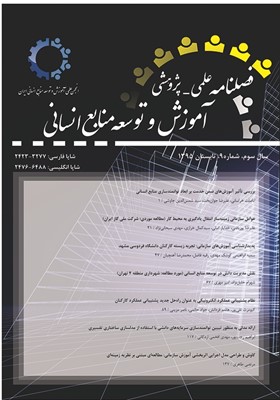نقش مدیریت دانش در توسعه منابع انسانی (مورد مطالعه: شهرداری منطقه 4 تهران)
محورهای موضوعی :شهرام خلیل نژاد 1 , امیر مهری 2
1 - مدیریت و حسابداری
2 - دانشگاه علوم تحقیقات
کلید واژه: مدیریت دانش, توسعه منابع انسانی, شهرداری تهران, ایران,
چکیده مقاله :
هدف این پژوهش مطالعه تأثیر مدیریت دانش بر توسعه منابع انسانی در شهرداری منطقه 4 تهران جهت ارایه پیشنهادات کاربردی برای افزایش سطح توانمندیهای سرمایه انسانی از مجرای استقرار نظام مدیریت دانش بوده است. پس از مرور ادبیات و پیشینه پژوهش به منظور تعریف مدیریت دانش چهار مؤلفه شناسایی، کسب، توسعه و تسهیم و برای توسعه منابع انسانی چهار مؤلفه توسعه نگرشی، دانشی، رفتاری و مهارتی حاصل شدند. با پیروی از فسلفه اثباتباوری، رویکرد قیاسی (کمی) و روش پیمایش، از پرسشنامه (مشتمل بر 45 پرسش) جهت گردآوری دادهها استفاده شده است. روایی صوری و محتوایی پرسشنامه از طریق انتخاب پرسشنامه استاندارد و ارایه آن به خبرگان، روایی سازه از طریق انجام تحلیل عاملی تأییدی و پایایی از طریق ضریب آلفای کرونباخ (91/0) تأیید شدند. جامعه آماری پژوهش کارشناسان، کارشناسان ارشد و مدیران این سازمان به تعداد 1100 نفر بود و نمونه آماری به روش تصادفی ساده و به حجم 285 نمونه انتخاب شدند. نرمال بودن دادهها از مجرای آزمون کولموگروف اسمیرنوف و روابط بین متغیرها و برازش مدل مفهومی پژوهش از طریق آزمون همبستگی پیرسون و آزمون معادلات ساختاری تأیید شدند. در نهایت مشخص شد که مدیریت دانش در توسعه منابع انسانی نقش معناداری (ضریب همبستگی 857/0 و بار عاملی 81/0) را ایفا میکند. همچنین مشخص شد که شناسایی، کسب، توسعه و تسهیم دانش بر توسعه دانشی، نگرشی، رفتاری و مهارتی سرمایه انسانی مؤثر است. در نتیجه یکی از نتایج مورد انتظار از توسعه نظام مدیریت دانش میتواند توسعه سرمایه انسانی در تمامی ابعاد باشد. همچنین، میتوان نتیجه گرفت که یکی از ابزارهای توسعه منابع انسانی استقرار نظام مدیریت دانش است.
This study investigated the effect of knowledge management on human resource development in Tehran Municipality Region 4 to provide practical suggestions for increasing the capabilities of human capital in the organization through knowledge management. The literature review identified four components consisting of identifying, acquiring, developing and sharing for knowledge management concept and four components consisting of attitude, knowledge, behavior and skill for human resource development concept. Following the positivism philosophy, deductive (quantitative) approach, and the survey method, a questionnaire (consisting of 45 questions) was used to collect field data. Face and content validity of the questionnaire were confirmed through selecting a standard questionnaire and submitting it to the experts, construct validity through confirmatory factor analysis and reliability through Cronbach's alpha coefficient (0.91). The number of population including undergraduate, graduate and managers of the organization, was 1,100 and the sample volume of 285 randomly selected. Data normality through the Kolmogorov-Smirnov test and relationships between variables and conceptual models through Pearson correlation and structural equation model approved. It turned out that knowledge management plays a significant role in the development of human resources (The correlation coefficient: 0.875; load factor: 0.81). It also became clear that identifying, acquiring, developing and sharing knowledge have impact on the development of knowledge, attitudes, behaviors and skills of human capital. As a result, one of the expected outcomes of knowledge management system can be development of human capital in all dimensions. Also, it can be concluded that one of the tools of human resource development is the establishment of a knowledge management system.
